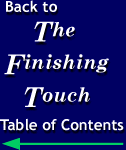

|
Issue Twenty-two, Winter 1999 |
Neatness and Details Count in Folding
By Randy Rasch, President
When you say "pre-folded" to your bindery representative, did you ever notice how he/she suddenly acquires symptoms like cold chills, fever and stomach pains? You think, "How cheap can you be to deny my company the folding cost just to add it to your bindery bill?"
But, beware--this is not at all the reason! Oftentimes the savings intended by pre-folding the materials is lost because more bindery costs are added to fix problems due to poor planning and sloppy folding. Simple, common-sense applications can make a big difference in the quality and cost of your job. So, if saving money, producing a better, higher quality product, and on-time delivery are important to you, read on.
The general idea of pre-folding your printed signatures is very prudent. It reduces your bindery bill. It allows you to maintain more control of difficult line-ups and critical work. You keep more of the money in-house. And, it can increase the output of your bindery supplier because they are able to begin producing finished products sooner. But, when all the details are not considered or prepared for correctly, then there can be problems.
Folding
for Perfect Binding
In doing it right, the first thing to consider is the method of finishing. If you are perfect binding, the spine fold should be perforated, but not just any perforation will do. It has to be strong enough to hold the signature together during collating, binding and trimming operations. If not, you have big troubles that can cost big dollars and lost books.
In all cases, all signatures should be on separate skids. If the run is small, you may put more than one signature on a skid, but the signatures must be kept in collating sequence. It seems to be common sense, but believe me, it's not always a given! Every day we restack incoming materials to reorganize for collating on our perfect binder. This costs us both a needless waste of money.
In doing it right, the first thing to consider is the method of finishing.
Skid
Packing
When skid packing, we ask for "high folio up" which means the low page number faces down. The tendency seems to be the exact opposite, but most of the binderies in Houston prefer high folio up because of the way their perfect binder feeds from the gathering line. Of course, it's always wise to ask your bindery supplier first.
Using skids that are the proper size and in good condition will also help to prevent transportation damage. Poor packaging means loss of product. Overs are needed for set-up and are billable products, so there's good reason to protect every sheet.
Ideally, a job should be delivered with neat, brick-stacked skids with no curl. Low page numbers should be faced-down, and signatures should be perforated so that the signature is flattened, but still strong enough for collating.
Folding
for Saddle Stitching
These packaging rules apply to saddle stitching as well. However, the perforations for saddle stitching are different. Here, the spine fold should not be perforated. The fold at the head of each signature should be perforated. These perforations are made to help remove unwanted air in the signatures. This air can cause wrinkles and keep the signatures from becoming flat before the next process begins. The flatter the signature, the better it will run and, therefore, the less it will cost.
We also recommend slitting the tail of all signatures if you are pre-folding. This will ensure that all down-line functions work well. A small increase in folder time can translate into significant savings when much higher cost centers such as perfect binding and saddle stitching are not hampered by too large of a tail trim or other components like covers, cards and inserts not fitting together. Many high-output bindery machines have joggers which even signatures at a very rapid pace to keep margins exact after the final trim is made. Uneven and different sized signatures cause problems that can only be solved by slowing down the machine. This transforms into higher bindery costs and longer production times.
Make your folding department aware of these issues. Have regular meetings with your in-house bindery supervisor and your outside bindery supplier. And remember, neatness counts!
PUR Binding | Perfect Binding | Saddle Stitching | Mechanical Binding
Tab Cutting | Support Services | The Finishing Touch Newsletter
EMail RGS | Home Page
7211 N. Gessner Drive • Houston, TX 77040-3143
Phone: 800 / 713-785-5750 • Fax: 800 / 713-785-5801